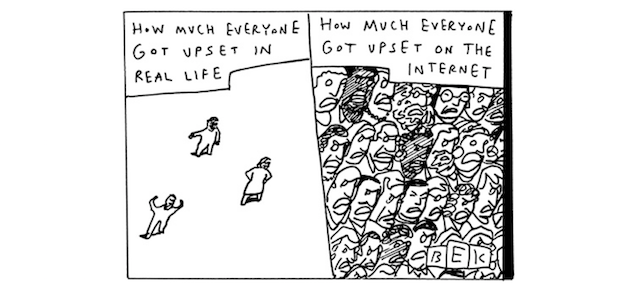
Here we are again, face to face with the beast; the beast named “Outrage.” The great Harambe is dead, and someone has to answer for his demise. The furious fingers of the incensed mob permeate the web with posts of “crucify her!” The young boy’s mother is clearly negligent and self-absorbed. How could she lose control of her own child in a public place? Her neglect led directly to the death of an endangered animal, and a majestic one at that. This is unthinkable. It’s horrific. It’s murder.
This is, of course, only Outrage’s latest feeding frenzy. The beast seems to emerge more and more often, glutting itself on blood and blame. Its black eyes scanning the landscape as it walks to and fro upon the earth, seeking whom it may devour.
Obviously, losing track of a child doesn’t in itself reflect poorly on anyone’s parenting ability. It’s basically a cliché that children are the world’s greatest escape artists. All of them, little Houdinis, wriggling out of whatever contraption you put them in and just vanishing.
 But Outrage doesn’t care. It isn’t a question of what’s true, but rather a question of what will satisfy its appetite.
But Outrage doesn’t care. It isn’t a question of what’s true, but rather a question of what will satisfy its appetite.
And before anyone starts to feel smug, let’s remember that Outrage’s psyche comprises more than one part. Right and left, young and old, religious and non, Buckley and Vidal – we’ve all created this monster. The beast is our child.
Dr. David Brin thinks that sanctimony is the most common yet unstudied emotional and psychological pathology. Put differently, according to Brin, self-righteous indignation is addictive.
He writes:
Indeed, one could look at our present-day political landscape and argue that a relentless addiction to indignation may be one of the chief drivers of obstinate dogmatism and an inability to negotiate pragmatic solutions to a myriad modern problems. It may be the ultimate propellant behind the current ‘culture war.’
Brin goes on to suggest that, if addiction to sanctimony really is the propellant he thinks it is, then addressing it may help us deal with a host of other issues. Undoubtedly, it would help. The question, though, is what you do with a creature whose default mode is addiction. Compulsion. Dependence.
John Calvin famously declared that the human heart is a factory of idols. That’s certainly true, but maybe John was only partly right. Maybe it’s that the human heart is a heroin den. Maybe it’s that we’re actually just as inclined to shoot up as we are to bow down.
We blame the mother not merely because we think we’re better than her. We do think we’re better, but sanctimony is just a symptom. We blame her because we need a fix.
We simply can’t help but return to the outrage needle. The relief we find there is too powerful and it solves too many problems, at least for a moment. Of course, as the science of addiction demonstrates more conclusively all the time, addiction isn’t really a choice. It’s an illness.
 Some will read that addiction is an illness and take it as a suggestion that humans aren’t responsible for their behavior. That’s not the point. It’s not that we aren’t responsible. It’s that we’re powerless. We are incapable of getting clean and sober on our own. Our wills are bound.
Some will read that addiction is an illness and take it as a suggestion that humans aren’t responsible for their behavior. That’s not the point. It’s not that we aren’t responsible. It’s that we’re powerless. We are incapable of getting clean and sober on our own. Our wills are bound.
Heroin addicts will tell you that they “get well” by using, not high. They wake up sick as dogs and reach for the needle because it’s their medicine. They have to do a shot to feel something like normal again. The other thing they’ll tell you is that they would do or give up almost anything to get their medication. Betray. Bargain. Beg. Whatever it takes. They simply can’t do otherwise, not without an intervention.
So it is with all of us. In one way or another, we’re self-righteousness junkies, and we’ll often do whatever it takes to get our shot of superiority.
But grace intervenes. One-way love has to go one way because, left to ourselves, we’d trade it for the syringe every time. We can’t choose to beat our addiction. All we can do is shift it around, trading it in for something else when it suits us.
We are by nature dependent. God in His grace breaks into our addicted hearts and says, “I will have you depend on me.”
Do we crawl back to our addictions? Does Outrage still take our hand and lead us back to its lair? Yes. But the good news is that Outrage will not have the last word. None of our many addictions has the last word. Jesus does.
So take heart. When you are outraged and wounded and weak and addicted and self-righteous and hopeless, God is with you.

COMMENTS
3 responses to “Feeding the Beast: Grace for an Outraged World”
Leave a Reply













Brilliant piece, thank you! Do you have a citation for the Brin quote, I’d love to read more.
Thanks, Gregory. Here’s the Brin piece: http://www.davidbrin.com/addiction.html